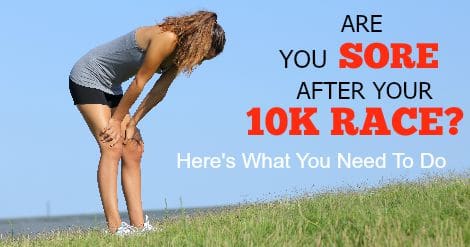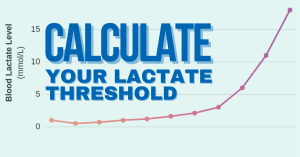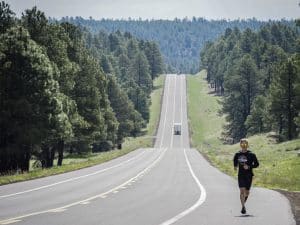Most experienced runners have a good handle on how to recover after a marathon.
And if you’re new to the distance, we have a very popular article on helping you plan your rest and recovery period. But there’s far less understanding when it comes to shorter race distances like the 10k and the half marathon.
How hard are these races on your body? Do you need a lengthy period of rest and a gentle, easy return to running program after a half marathon, or can you barrel right back into training?
That is what we are going to explain in this article today, and then give you the best advice we can give about how to reduce your recovery time (and get be less sore) by “listening to your body” to know when your body is ready to start running hard again.
Why Am I Sore After Some Races but Not Others?
It’s hard to judge the difficulty of a race distance subjectively.
Everyone’s got a different opinion, and a well-run race can leave you feeling pretty beat up, no matter the distance. We could get a much clearer picture of how damaging different race distances are if we could take a peek inside your body to survey the damage.
Modern science isn’t quite advanced enough to fully evaluate damage to muscles, tendons, bone, and the nervous system, but what we can do is take a look at blood markers for muscular damage.
A particular category of proteins called cytokines can be used as a marker for muscular damage, because when muscle cells are destroyed, cytokines are released into the blood to stimulate the immune system and jump-start repair. Though cytokines are neither the cause nor the solution to muscular damage during exercise, they’re nevertheless a useful proxy for measuring the degree of muscular damage that a runner has sustained after a tough race.
In this respect, measuring cytokine levels to evaluate muscular damage is similar to measuring lactate levels to measure acute fatigue.
Does a longer race always need a longer recovery?
The scientific literature is chock-full of studies that look at the body’s cytokine response to everything from short, easy runs to hundred-mile races through the mountains.
Now:
There are many kinds of cytokine proteins, and each of them plays a particular role in a complex dance of cellular signaling, we’ll have to pick just one to look at to compare different race distances.
We’ll use a cytokine called interleukin 6, or IL-6 for short. It acts as an inflammatory signal to kick your immune system into high gear, and it responds very strongly to stresses like muscle damage (whether from a hard run or from a burn or acute injury).1
When surveying the literature, it becomes apparent that longer races have an exponentially greater effect on IL-6 levels in the blood afterwards, indicating they are causing more muscular damage.
A 1996 study by Papicolauo et al. found that IL-6 levels increased by 2.5 times their baseline levels after a 25min hard run. Another study by Starkie et al. found that 60 minutes at the lactate threshold caused IL-6 values to spike 20-fold.
It get’s worse:
A slew of studies on marathon runners found that IL-6 values can increase by 25-128 times their baseline levels!
Contrast this with a 2002 study by Suzuki et al. which found no change in IL-6 levels following a 10-minute maximal treadmill run (and a 100-fold increase following a marathon), and it’s clear that there’s a non-linear relationship between race length and IL-6 levels in the blood.2
According to Katsuhiko Suzuki and colleagues at Hirosaki University School of Medicine in Japan, the turning point appears to be somewhere at or just before one hour of hard running.
After how long does a race drastically increase your recovery time?
When a race lasts substantially less than an hour, there isn’t much, if any, IL-6 released into the blood—at most, levels might double or triple, as they did in Papanicolaou et al.’s study.
Here’s the deal:
When a race is much further than one hour in duration, muscle damage starts to ramp up very quickly. The studies with the highest IL-6 concentrations (in the range of 80-100-plus-fold increase in IL-6) were all experiments involving marathon runners who took over three hours to complete their race.
What this means for you is that you should treat longer races with the respect they deserve—even if it’s not a marathon, you should take it easy for several days following a half marathon, a 10-miler, or a 15k.
Perhaps even consider a few days off.
Now:
The 10k is a bit in between; if you’re a faster runner who can cover ten kilometers in under 40 minutes, you’re probably okay to jump back into training more quickly.
However, if you’re on the slower end, running 45, 50, or 60+ minutes for 10k, you should realize that the 10k represents a fairly significant toll on your body.
Cytokine levels in the blood aren’t perfect metrics of muscle damage, nor are they an excuse to not listen to your body, but they do give you some empirical evidence to evaluate how hard a race is on your body.
For most runners, doing a 5k or a 10k won’t beat up your muscles too bad, but anything further, like a 10-miler or a half-marathon, needs a good amount of recovery afterwards. And marathons, of course, require exponentially more recovery even than a half marathon.
Is There Anything I Can Do to Help Limit the Soreness While I Recover?
After reading this post you feel more at ease. You can take a deep breath knowing that the post race soreness is normal, and have a general idea of why your body feels so sore, but what about the physical pain associated with recovery.
You hobble around the house. You wince even thinking about stairs, and even though you know it will pass, you want to help your body feel good again, so you can get back to training (and walking normally) as soon as possible.
Here are 5 ways you can allow your body to get back to normal as soon as you can:
Rest
We know this is the last thing runners want to hear (trust me, we are cringing even writing this), but its true. Make resting a focus.
Now, when we say rest, we do not mean lying on the couch for a week, barely moving, using your loved ones as slaves to bring you what you need while you recover, but after a race, your body does require extra time to divert the love and attention to your aching muscles.
This means getting to bed an hour earlier than you would have, and taking a little more time each day to put your feet up and be still, especially in the first few days following a race.
However:
Make sure you do move around. Go on a short walk to make the most of your down time, or play catch with your kids. This will help get the blood flow moving, meaning when you do rest, your blood is full of fresh blood to help clear the bad stuff.
Massage
Although we would not recommend getting a deep tissue massage the afternoon of your race (or even the day after), a few days after the race, a massage is a great way to flush out the soreness. Get your massage therapist (or even a friend who is in a good mood) to work on encouraging the tight spots to loosen up.
If a full body massage is unrealistic, foam rolling out your muscles is a great second option. Make sure you do not make these 4 foam rolling mistakes though!
Refuel with recovery foods
Although some trashy magazines may lead you to believe so, there is no magic pill to help your body recover. There are however some foods that can promote healing, and reduce the muscle soreness you feel.
These foods should be incorporated into your diet and eaten as often as possible. The more you are able to build them up in your system, the better prepared your body is going to be at moments like this. We talked about this more in our podcast with Dr. Steve Gangemi, and the more you eat these kinds of foods, the better you will feel.
- Tart Cherries
- Strawberries
- Blueberries
- Raspberries
- Pomegrante
- Broccoli
- Chili Peppers
- Sweet Potatoes
- Beets
- Salmon
- Almonds
- Sunflower Seeds
- Cinnamon
- Tumeric
- Ginger
If you are feeling particularly sore, why not cook a nice salmon fillet with some kind of ginger or curry (turmeric) dressing, serve with broccoli and a sweet potato topped with almond butter. Lots of powerful recovery foods in one meal, and something that is sure to leave you feeling confident about your future running.
Compression
You may have seen plenty of runners putting on their compression socks immediately following a race, especially on their calves, which are an area which are a common area runners get sore following a race, but this is not just for show.
We covered the benefits of compression gear, and the science behind compression clothing in previous posts, but compression clothing can be particularly beneficial for reducing soreness after a race.
Soak in warm water
Sometimes all you need is just a nice warm bath to soothe those sore muscles and give you a few moments of relaxation. The more your body is able to relax, the quicker it is going to be able to get to work on getting you back to normal. So fill yourself a nice bath, add some epsom salt if you like, and take 15-20 minutes to just be.
And if nothing else, it will allow you to forget about your muscles for a few precious moments.






2 Responses
Is there any research on how long it is before you return to normal IL-6 levels with rest and without rest? Also, is there a difference between hard effort and “just a little harder than training runs” effort on IL-6 levels? I ask this because many of our running club members run races every weekend (sometimes 2 in a weekend), but treat most of them as an event and run just hard enough to “get points” in the races series. So, they may take more than 60 minutes for a 10K, but the effort is not close to lactate threshold or barely tempo pace. Thanks!
Hi Joyce, I am not aware of any such research, but I will get our writer to look into it for you! You may just need to clarify what you mean by rest and without rest…..are you saying total time off vs running week after week? We have covered about recovery from hard workouts, which from what you are saying is what a lot of your club are doing….using those races as hard workouts? Hope this helps! https://runnersconnect.net/running-injury-prevention/recovery-from-running-hard-workouts/ Will look into a future post for you!